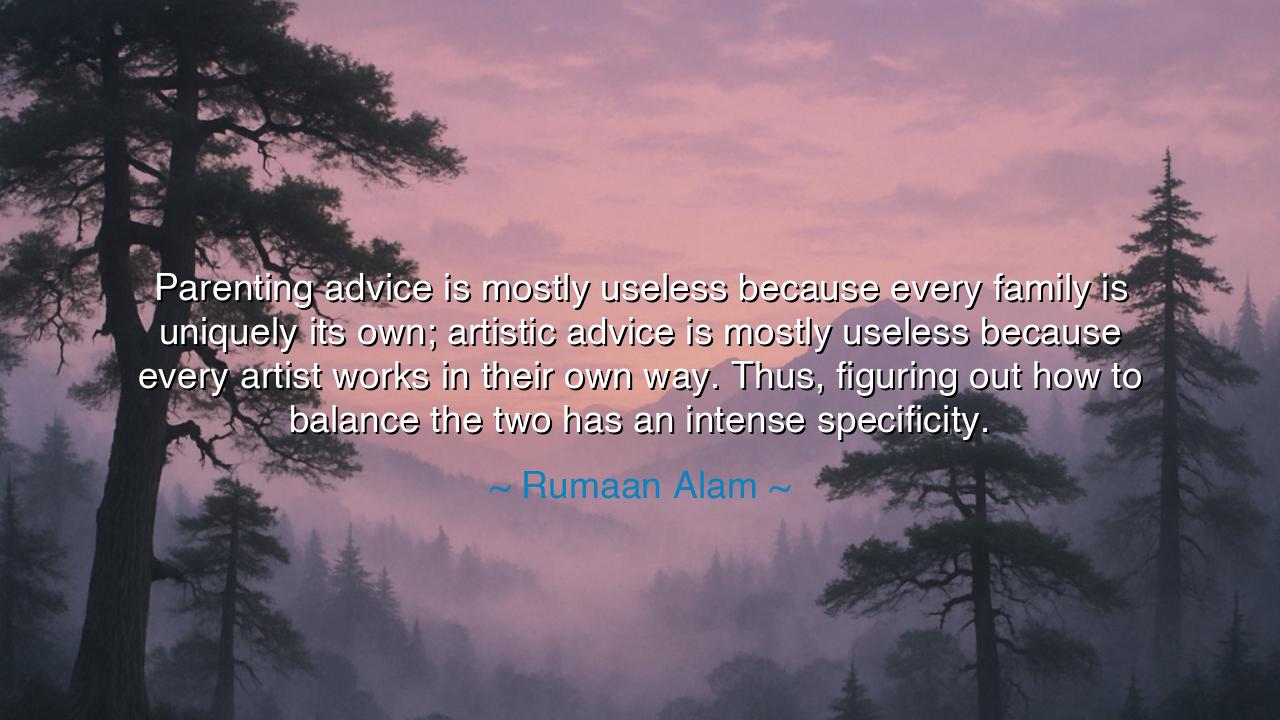
Parenting advice is mostly useless because every family is
Parenting advice is mostly useless because every family is uniquely its own; artistic advice is mostly useless because every artist works in their own way. Thus, figuring out how to balance the two has an intense specificity.






Hear the voice of Rumaan Alam, who spoke with a wisdom sharpened by both humility and experience: “Parenting advice is mostly useless because every family is uniquely its own; artistic advice is mostly useless because every artist works in their own way. Thus, figuring out how to balance the two has an intense specificity.” These words carry the weight of paradox. They remind us that while mankind has ever sought counsel and instruction, there are journeys which no teacher can fully chart, paths which must be carved by the soul that walks them. Parenting and art are such journeys—each deeply personal, each shaped by circumstances no other can wholly grasp.
From the dawn of time, elders have offered guidance on raising children and on shaping art. The scrolls of antiquity are filled with maxims: how to discipline, how to nurture, how to paint, how to sing. Yet as Alam reveals, such counsel often falters, for every family is uniquely its own, like a constellation set apart in the sky. The stars may all burn, but each shines with its own light, and no map can capture the fullness of their glow. So it is with households: what brings peace to one may sow discord in another. The wisdom of the ancients must be tempered by the living reality of each home.
The same is true of artistic advice. Teachers may instruct in brushstrokes, in verse, in rhythm, but the soul of art resists formula. Every artist is a vessel for a singular vision, born from the collision of memory, struggle, and desire. To follow another’s way too closely is to silence one’s own voice. Just as no two children are the same, no two acts of creation are the same. Alam’s insight pierces the heart: advice may inspire, but it cannot dictate. The true artist, like the true parent, must discover their own method through trial, failure, and perseverance.
Consider the life of Leonardo da Vinci, who apprenticed under Verrocchio yet soon diverged into paths wholly his own. The advice he received gave him tools, but not direction. His genius flowered not because he obeyed another’s rules, but because he dared to trust the fierce particularity of his vision. Likewise, parents may study books and heed lectures, yet in the quiet hours of the night, when the child weeps and no solution is found, they must discover for themselves what comforts, what heals, what works in their singular household. Neither art nor parenthood may be mastered by imitation; both demand the courage of specificity.
The heart of Alam’s teaching lies in the balance of these two realms. For many who walk both paths—the parent who is also the artist—the struggle is fierce. Time is scarce, energy divided, the demands of one often stealing from the other. How, then, to reconcile? The answer is not in universal instruction, but in personal harmony, forged by the individual who knows both their child and their craft. What nourishes one family may starve another; what fuels one artist may suffocate another. Thus the balance is not general but intensely specific—crafted in the fire of lived experience.
Let us not despair at the uselessness of advice. Instead, let us treat counsel as kindling: it may spark thought, but the flame must be our own. Wisdom from others is not a map, but a lantern; it illuminates a little of the path, but it cannot walk the road for us. The parent must listen to their child’s spirit; the artist must heed their own muse. Between these two voices lies the truth that no outsider can fully articulate.
Therefore, take this lesson, you who hear: seek advice, but do not be bound by it. Trust the uniqueness of your family, honor the individuality of your art. Experiment, adjust, and remain patient. Accept that failure is a teacher as vital as success. Above all, remember that both parenting and art are acts of creation, and creation is sacred precisely because it cannot be repeated in the same way twice.
Thus Rumaan Alam’s words, though sharp in their dismissal of advice, are not words of despair but of empowerment. They call us to embrace the holy burden of individuality. For in the end, the true wisdom is this: no one can teach you how to be the parent your child needs, nor the artist your soul demands. That wisdom must be lived, not borrowed. And if you walk this path with courage, your life will become both a family and a work of art.






AAdministratorAdministrator
Welcome, honored guests. Please leave a comment, we will respond soon